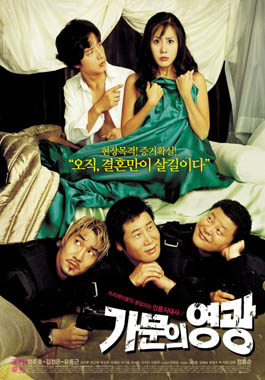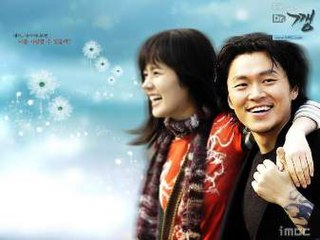
Inha University is a private research university located in Incheon, South Korea. Known traditionally for research and education in the engineering and physical sciences, the university was established by the first president of South Korea, Syngman Rhee. Inha is a Korean-American collaboration school, even in its name: the Morpheme "In" comes from the city of Incheon and "Ha" from Hawaii, USA. Started as a polytechnic university in 1954, named Inha Institute of Technology, the institute has been achieving national recognition and a strong reputation as a technological research university thereafter.

Autumn in My Heart (Korean: 가을동화) is a 2000 South Korean romantic television drama starring Song Seung-heon, Song Hye-kyo, and Won Bin. The series is the first installment of season-themed tetralogy Endless Love drama series directed by Yoon Seok-ho. It aired on KBS2 from September 18 to November 7, 2000, on Mondays and Tuesdays at 21:55 (KST) for 16 episodes.

My 19 Year Old Sister-in-Law is a 2004 South Korean television series starring Jeong Da-bin, Yoon Kye-sang, Kim Jaewon and Kim Min-hee. It aired on SBS from July 28 to September 23, 2004, on Wednesdays and Thursdays at 21:55 for 16 episodes.
Seoul Institute of the Arts is a prominent educational institution specializing in the Arts located in Ansan, Gyeonggi Province, South Korea. The school has nurtured many graduates who are actively working in art related fields within Korea as well as internationally. The Namsan campus in the heart of Seoul is used for presentation of arts productions and convergence with industry. The Ansan Campus opened in 2001 and is used for educational training, which aims to tear down barriers between disciplines, genres, and majors. The Institute continues to be a forerunner in globalization of Korean arts and creation of new forms of arts.

Marrying the Mafia is a 2002 South Korean film released on September 13, 2002, and the first installment of the Marrying the Mafia series.

East of Eden is a 2008 South Korean television series, starring Song Seung-heon, Yeon Jung-hoon, Lee Da-hae, Han Ji-hye, Park Hae-jin and Lee Yeon-hee. It was produced by Chorokbaem Media as a 47th Anniversary Special Project Drama for MBC, on which it aired from August 25, 2008, to March 10, 2009, on Mondays and Tuesdays at 21:55 for 56 episodes. The ₩25 billion drama tells the story of the brothers Dong-chul (Song) and Dong-wook (Yeon). Their fates diverge after the murder of their coal miner father, with one joining the mob and the other becoming a successful lawyer.

Dream (Korean: 드림) is a 2009 South Korean television series that follows the lives of a sports agent and K-1 fighters. Starring Joo Jin-mo, Kim Bum and Son Dam-bi, it aired on SBS from July 27 to September 29, 2009 on Mondays and Tuesdays at 21:55 for 20 episodes.

Sungkyunkwan Scandal is a South Korean historical drama starring Park Yoo-chun, Park Min-young, Song Joong-ki, and Yoo Ah-in. Directed by Kim Won-seok and written by Kim Tae-hee, it is based on Jung Eun-gwol's bestselling 2007 novel The Lives of Sungkyunkwan Confucian Scholars. It aired on KBS2 from August 30 to November 2, 2010 on Mondays and Tuesdays at 21:55 for 20 episodes.

The Great Seer is a 2012 South Korean historical television series, starring Ji Sung, Ji Jin-hee, Song Chang-eui, Kim So-yeon and Lee Yoon-ji. Set during the turbulent decline of Goryeo, it is about practicers of divination and the power that they hold over the fate of the country. It aired on SBS from October 10, 2012 to February 7, 2013 on for 35 episodes.

Five Fingers is a 2012 South Korean television series starring Ju Ji-hoon, Chae Shi-ra, Ji Chang-wook and Jin Se-yeon. It aired on SBS TV's Saturdays and Sundays at 22:00 (KST) time slot, from August 18 to November 25, 2012, for 30 episodes.

Becoming a Billionaire is a 2010 South Korean television series starring Ji Hyun-woo, Lee Bo-young, Lee Si-young and Namkoong Min. It aired on KBS2 from March 1 to May 4, 2010, on Mondays and Tuesdays at 21:55 for 20 episodes.

Jejungwon is a 2010 South Korean period medical drama television series about the founding and early years of Jejungwon, the first modern Western hospital in the Joseon Dynasty. The hospital was founded in 1885 and began accepting a small class of students for training in Western medicine.

Special Affairs Team TEN is a South Korean crime procedural television series starring Joo Sang-wook, Jo An, Kim Sang-ho and Choi Woo-shik. It was broadcast by cable channel OCN.

Jeong Do-jeon (Korean: 정도전) is a 2014 South Korean television series starring Cho Jae-hyun in the title role as Jeong Do-jeon, a real-life historical figure (1342–1398) who was one of the most powerful scholars and politicians of his time and a close supporter of King Taejo, the founder of the Joseon Dynasty. The period drama shows the crucial role Jeong had in the planning and founding of Joseon and the obstacles he faced in the process, as well as his lasting impact on Joseon's politics and laws. It aired on KBS1 from January 4 to June 29, 2014, on Saturdays and Sundays at 21:40 for 50 episodes.

Dr. Kkang is a 2006 South Korean television series starring Yang Dong-geun, Han Ga-in and Lee Jong-hyuk. It aired on MBC from April 5 to May 25, 2006, on Wednesdays and Thursdays at 21:55 for 16 episodes.

Blade Man is a 2014 South Korean television series starring Lee Dong-wook and Shin Se-kyung. It aired on KBS2 from September 10 to November 13, 2014, for 18 episodes.

Warm and Cozy is a 2015 South Korean television series starring Kang So-ra and Yoo Yeon-seok. Written by the Hong sisters as a twist on the fable of The Ant and the Grasshopper, it aired on MBC from May 13 to July 2, 2015 on Wednesdays and Thursdays at 22:00 for 16 episodes.

Weightlifting Fairy Kim Bok-joo is a 2016–2017 South Korean television series starring Lee Sung-kyung in the title role, with Nam Joo-hyuk. It is a coming-of-age sports drama, inspired by the life of Olympic gold-medalist Jang Mi-ran. It aired on MBC every Wednesday and Thursday at 22:00 (KST) from November 16, 2016, to January 11, 2017.

Catch the Ghost is a 2019 South Korean television series starring Moon Geun-young and Kim Seon-ho. It aired on tvN from October 21 to December 10, 2019.

Private Lives is a South Korean television series starring Seohyun, Go Kyung-pyo, Kim Hyo-jin, Kim Young-min, and Tae Won-seok. It aired on JTBC from October 7 to November 26, 2020 and is available for streaming worldwide on Netflix.



















